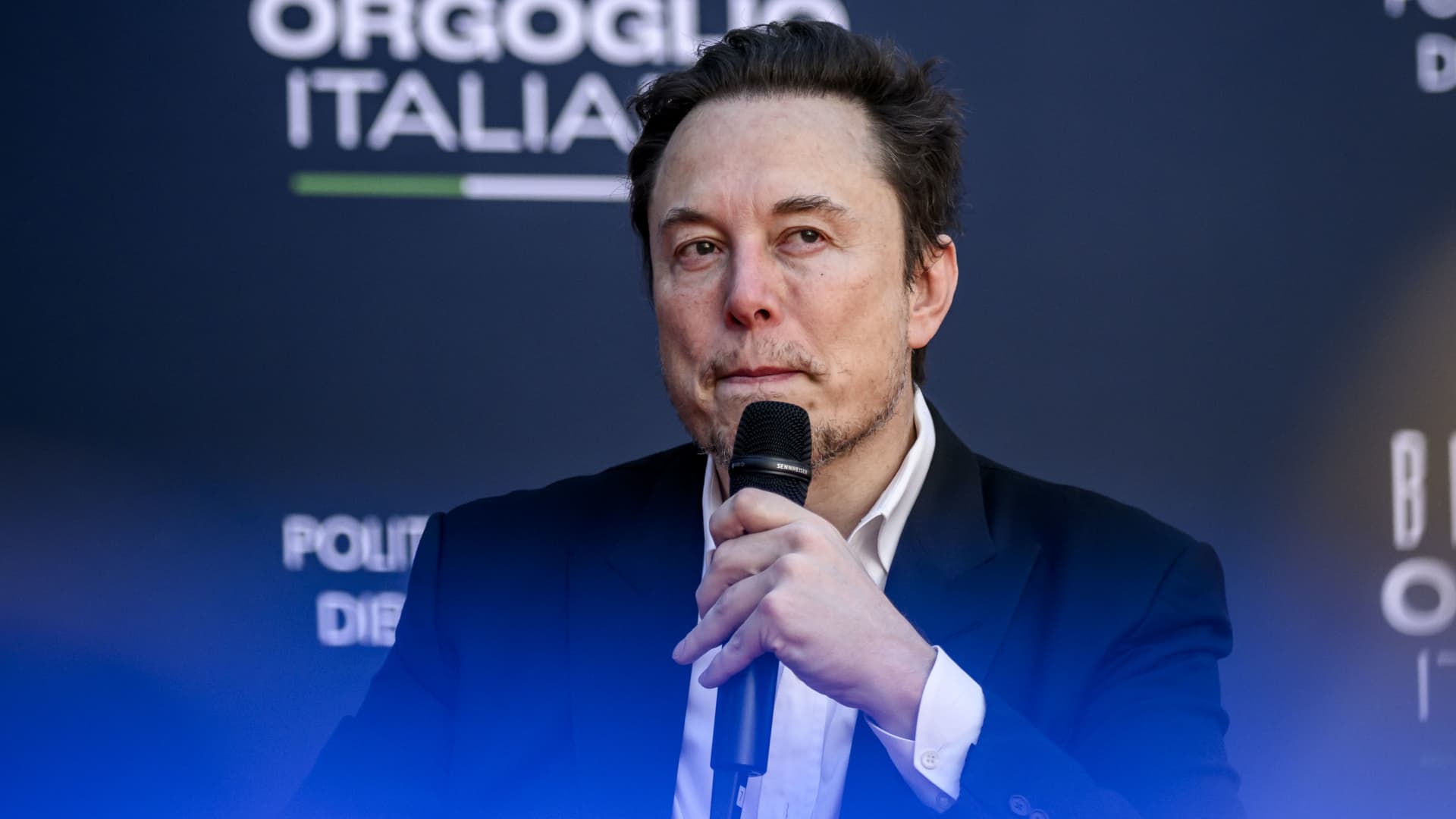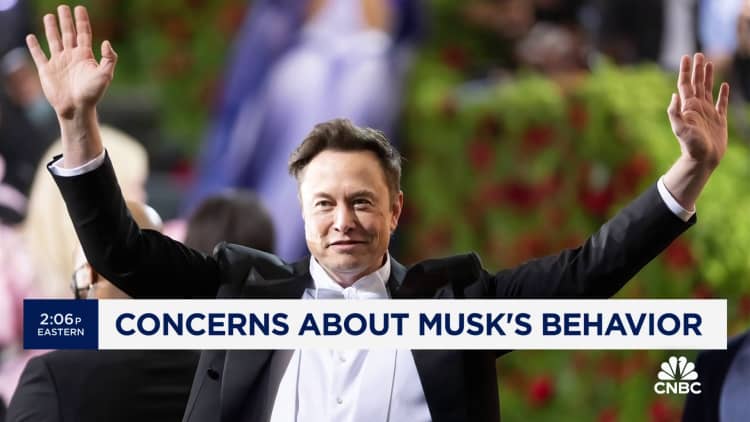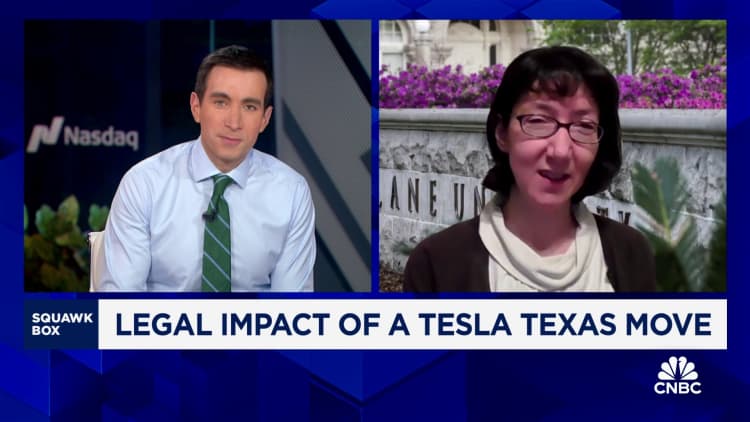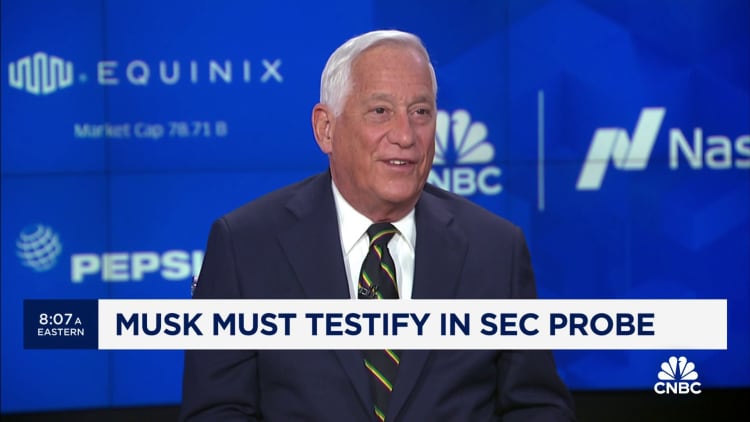

Elon Musk, CEO of Tesla and X, speaks at the Atreju political convention organized by Fratelli d’Italia (Brothers of Italy), in Rome, Dec. 15, 2023.
Antonio Masiello | Getty Images
Two weeks after a Delaware court ruled that Tesla must rescind Elon Musk’s $56 billion pay package, the company’s board remains mum on what the decision means for shareholders or what’s next for the mercurial CEO.
In her 200-page opinion on Jan. 30, Chancellor Kathaleen McCormick called the pay plan the largest in public corporate history, and said it was agreed upon by people “who were beholden to Musk.” Since then, Musk has lashed out at the court, posted “Never incorporate your company in the state of Delaware” on his social media platform X, and said Tesla would hold a shareholder vote to move its site of incorporation to Texas.
Tesla hasn’t yet issued an SEC filing to notify shareholders of the ruling.
The decision came shortly after Musk indicated that he’s pushing for even more control of Tesla, posting on X in mid-January that he wanted roughly 25% voting control before turning the company into a leader in artificial intelligence and robotics. Musk is already building an AI company called xAI outside of Tesla.
The next step in the compensation case is an “implementing order” that will be hashed out between the court, Musk’s team and the lawyers representing shareholder Richard Tornetta, a former heavy metal drummer who was the plaintiff in the 2018 lawsuit filed on behalf of all Tesla investors.
As shareholders await answers, Tesla’s eight-person board, which includes Musk, his brother Kimbal, Chairwoman Robyn Denholm and former Tesla technology chief JB Straubel, has stayed silent, avoiding any public comments.
CNBC sent requests for additional information to Tesla investor relations, Musk and some board members. They all went unanswered.
Greg Varallo, who was lead counsel for Tornetta and is head of the Delaware office of Bernstein Litowitz Berger & Grossmann, told CNBC that theoretically Musk and his legal team could still pursue a last-minute settlement. While Varallo said he has no knowledge of Musk’s plans, he said he expects Musk to appeal the decision to the Delaware state Supreme Court.
“I’d give you very high odds on that,” Varallo said.
Kobi Kastiel, a law professor at Tel Aviv University, also predicts that Musk will appeal the ruling. Kastiel wasn’t involved in the litigation but he co-authored a 2023 paper in the Washington University Law Review titled “Superstar CEOs and Corporate Law” that was cited in McCormick’s ruling.
“Given the high stakes involved, it is likely that Tesla will appeal the decision,” Kastiel said in an email. In the absence of a successful appeal, “any new compensation arrangement with him will have to be assessed” in light of McCormick’s decision, Kastiel said.
‘Bunch of options would be returned’
In the 2018 CEO compensation plan, Tesla’s board awarded Musk a dozen tranches of stock options that would finish vesting in 2022 and were based on milestones, including many focused on stock price increases.
Between the beginning of 2018 and the end of 2022, Tesla shares soared almost 500% as Musk promised to turn Tesla into not just a dominant EV brand, but a robotaxi company and solar juggernaut, among other things. The S&P 500 gained 44% over that stretch, while the Nasdaq rose 52%.
Eric Talley, a professor at Columbia Law School, told CNBC that, should the ruling stand, Musk will lose his options but not any shares he previously held. The move would decrease the number of shares outstanding, potentially bolstering the value of each share held by investors.
“A bunch of options would be returned to Tesla’s coffers, which is hugely accretive to stock value,” said Talley, who wasn’t involved in the case. On the other hand, Talley pointed out, “Tesla has a very grumpy CEO who might want to take his ball and go home. Thus far, trading suggests those two factors have been a wash.”
Tesla shares are down slightly since the Delaware court’s decision in late January. They’re down close to 25% for the year, while major indexes are up.
Musk voiced a strong preference for moving his businesses out of Delaware following the court’s decision, and encouraged others to do so as well.
He moved the incorporation location for his brain computer interface company, Neuralink, from Delaware to Nevada, filings revealed last week. He’s also been a big proponent of Texas in recent years, personally relocating there from California, and building massive complexes for SpaceX and Tesla in the state, which has no personal income taxes and a much lower business tax rate.
Author Walter Isaacson, who published a 688-page biography on Musk last year, told CNBC’s “Squawk Box” on Monday that if the ruling doesn’t get overturned, “it’s going to hurt Delaware.”
“People will say, ‘Wait, wait, you mean five years after something happens, eight years after something happens, you’ll go back and undo it?'” Isaacson said.
Tulane Law School professor Ann Lipton had a different take.

“It’s a very thorough opinion and the Supreme Court should give great deference to the factual findings of the trial court,” Lipton said.
In terms of what shareholders should ask of Tesla’s board now, Kastiel said, “Tornetta and recent media reports on Musk have emphasized the importance of accurate and detailed disclosure of the ties between controlling shareholders and directors.”
There’s a more fundamental concern at play, Kastiel said, regarding corporate governance in cases where a “superstar CEO” is running the show.
“As long as the CEO is perceived as a star and the company depends on the CEO’s vision and leadership, even nominally independent directors — those without strong ties to the CEO — will have difficulty monitoring the CEO’s conduct,” he said.
Kastiel also said that the decision likely makes Musk and Tesla more vulnerable to other types of lawsuits.
“Plaintiffs may have a better chance of advancing their claims by potentially leveraging the Tornetta findings to argue that the majority of the Tesla board is not independent of Musk,” he said. “To mitigate this risk, Tesla will need to significantly enhance the independence of its board and nominate new independent directors who do not have strong ties to Musk.”
WATCH: Elon Musk has a lot of ‘incoming missiles’ from all sides, says Isaacson






